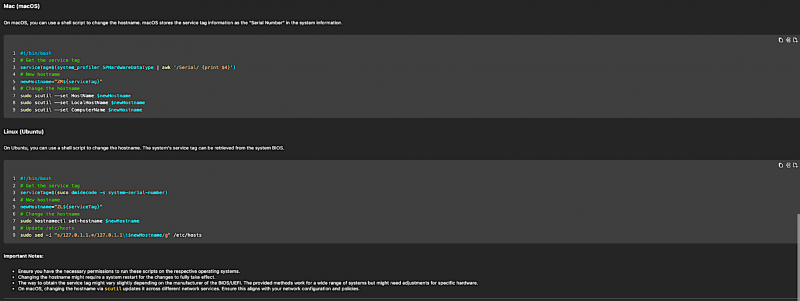Writing scripts for security tasks can sometimes cause SecOps teams some difficulty. StackSpot AI, an AI assistant for software development, helps by creating scripts faster and more securely. It simplifies script creation for non-developers, automates updates, and helps maintain consistent security configurations across teams. This improves efficiency and reduces errors in security operations.
A Security Operations (SecOps) team is a dedicated unit responsible for managing and enhancing an organization's security posture. Comprising skilled professionals, SecOps teams integrate security practices into the overall operations, ensuring the protection of information systems, networks, and data.
Their essential functions include monitoring, threat detection, incident response, vulnerability management, and collaboration with other IT and operational teams.
SecOps emphasizes a proactive approach to cybersecurity, aiming to swiftly identify and mitigate potential threats. The team is pivotal in safeguarding sensitive assets, maintaining compliance, and fortifying the organization's resilience against evolving security challenges.
However, SecOps teams constantly deal with challenges in script creation for vulnerability correction, software deployment, and standardization. The complexities intensify for non-developers within the team.
In essence, we observed a critical need for a solution that could bridge the gap for non-developers within SecOps, offering an efficient and secure avenue for script creation, standardization, and automation across diverse operating systems. In this context, StackSpot AI emerged as a potential solution.
SecOps Challenges
We talked to a SecOps team to understand their challenges. According to the members, they have challenges crafting intricate scripts for vulnerability correction, and software deployment is a formidable task, which is a hurdle for non-developers.
According to our interviewee, there are inherent challenges in automating routine tasks, such as software updates, wherein the intricacies of commands across different operating systems (such as Windows, Linux, Ubuntu, and MacOS) require a level of technical proficiency. The manual creation of scripts demanded meticulous attention to detail, often leading to time-consuming efforts.
Furthermore, the SecOps team needs to collaborate closely with other teams, further underscoring the necessity for a streamlined approach in script generation to ensure consistency and adherence to security protocols.
Additionally, the overarching concern for security and the potential risks associated with sourcing scripts from external repositories further compounded the hurdles faced by the team.
Meet StackSpot AI
In contrast to general AI coding assistants such as GitHub Copilot or Amazon Code Whisperer, StackSpot AI is a coding AI assistant contextualized for software development tasks. This contextualization is based on knowledge sources, that is, as any representative documents that developers could use to support their tasks. For instance, when developers have to integrate their code with a third party service, the API that performs this connection can be seen as a knowledge source. Knowledge sources then enrich LLM prompts, which in turn help users to answer their contextualized questions.
Knowledge sources are the bedrock of any robust information retrieval and processing system, like StackSpot AI. The integrity and utility of these systems pivot on the quality and representativeness of the information they draw upon.
Representative knowledge sources ensure that the data is pertinent, authoritative, and mirrors the multifaceted nature of the real world. They enable the delivery of insights that are accurate, comprehensive, and applicable to current scenarios.
Selecting representative knowledge sources is critical to providing relevant, reliable, and nuanced responses, indispensable for LLM-based applications.
StackSpot AI in SecOps Teams
For the SecOps teams we interviewed, adopting StackSpot AI has significantly streamlined various critical processes. The tool has proven instrumental in several tasks, which we discuss next.
1 - Efficient Script Creation
StackSpot AI's impact on script creation for vulnerability correction and software deployment is marked by increased efficiency.
As highlighted by the team member, the tool's speed in generating scripts stands out, resulting in considerable time savings when compared to manual methods.
The emphasis lies on the pragmatic acceleration of the script creation process, enhancing the overall operational workflow within the team.
For instance, the figure below illustrates some of the scripting suggestions provided by StackSpot AI to block UDP/TPC ports.
Image 1
2 - Simplified Standardization and Approvals
Within the framework of standardization and approvals, the tool streamlines the creation of standardized configurations, particularly in collaboration with other teams, such as the Blue Team (that is, a team focused on defensive cyber security, responsible for preventing and identifying security threats). This collaboration ensures a uniform and secure methodology in security operations.
The tool minimizes variations and fosters a standardized approach across configurations. Establishing a consistent methodology makes the process more robust, reinforcing security measures within operations.
The collaboration with the Blue Team further solidifies the collective efforts in maintaining a standardized configuration framework, which is essential for a cohesive and secure security operational environment.
For instance, as depicted in the following figures, StackSpot AI eases the effort in maintaining different versions of the same routines for different operating systems.
Image 2
Image 3
3 - Automation of Updates
Leveraging StackSpot AI for automating updates introduces an enhanced approach to managing routine tasks. The tool reduces the likelihood of human errors and elevates the dependability of operational procedures.
This utilization of StackSpot AI contributes to heightened operational reliability and accuracy, showcasing the tool's pragmatic role in handling recurring tasks within the domain of system updates.
4 - Security in Script Generation
The team member's use of StackSpot AI's security underscores its reliability. The tool's assurance lies in it not storing passwords or sensitive data, a critical aspect for secure script generation, adding a layer of trust.
In essence, StackSpot AI's commitment to not storing sensitive data enhances its role in script generation processes, providing a secure foundation for executing critical operations within security-focused contexts.
Conclusion
The challenges faced by SecOps teams in script creation demanded an efficient solution. StackSpot AI, tailored for software development, emerged as a pragmatic remedy.
Its impact is evident in streamlining script creation processes, increasing efficiency, simplifying standardization, and enhancing security in operations. Addressing the intricacies non-developers face, the tool significantly accelerates workflows and reduces time-intensive tasks. Through collaborative efforts and a commitment to not storing sensitive data, StackSpot AI contributes to a secure foundation for critical operations within the security-focused domain.
StackSpot AI is an exciting approach for those navigating the complexities of script standardization and automation within SecOps teams.
To learn more, reach out today and begin to see the possibilities.




